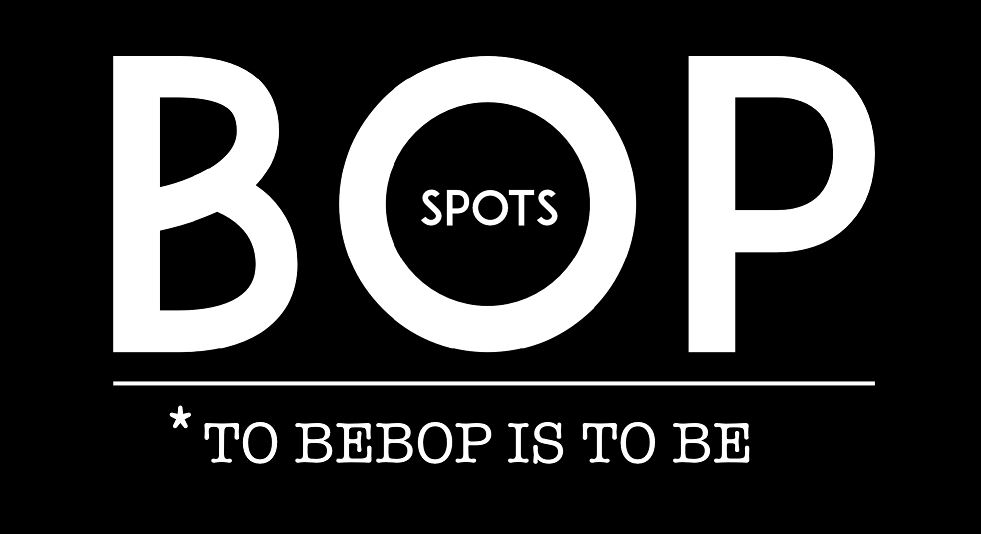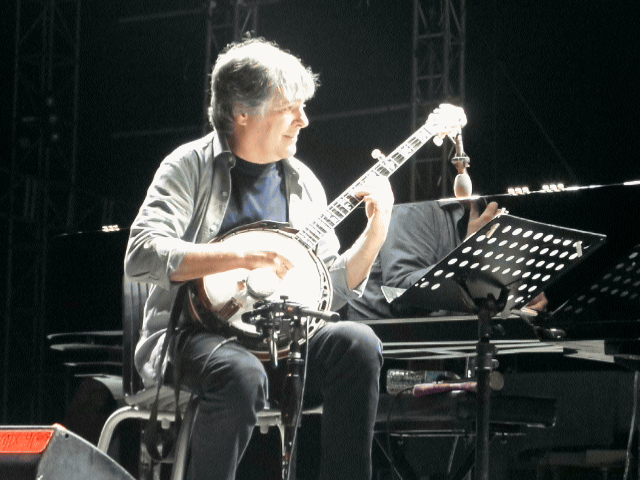
Béla Fleck is an iconic idol in the history of music, in the history of jazz and in the history of banjo. I won’t tell you much about this wonderful improviser and composer of the world of classic music, bluegrass, jazz and pop… because I’m sure you already heard his iconic band: Béla Fleck and the Flecktones, and all you have to know about him is in this exclusive interview he gave to Bop Spots in his visit to Mexico, before playing in the Riviera Maya Jazz Festival 2017.
Riviera Maya, December 1st, 2017
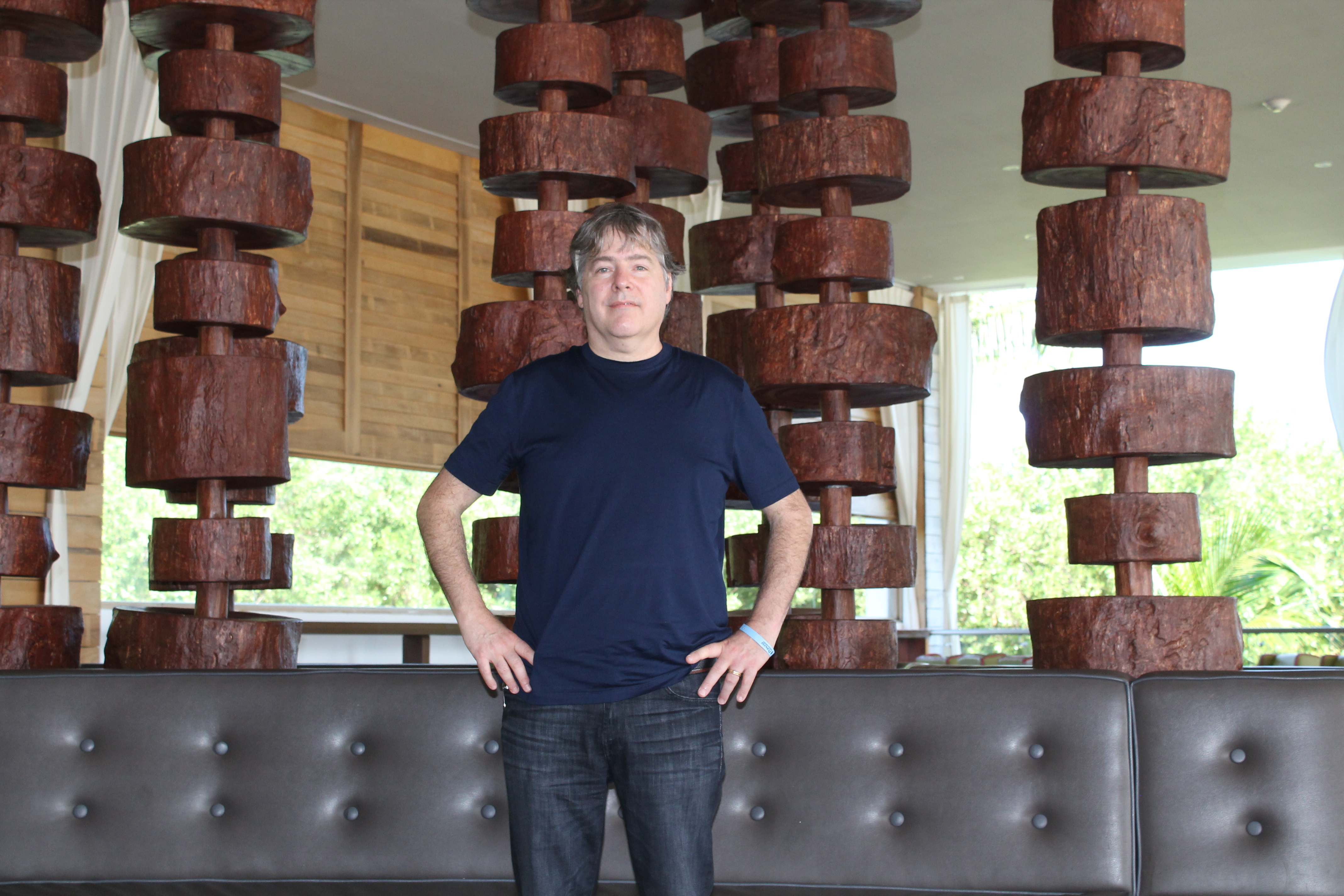
-I have listened to a lot of albums that you’ve made. Each of them are great. I am amazed by all the things that you can do.
-Thank you!
-But, actually… I quite like one of those: The Melody of Rhythm. You created something new, but you took music from the India, from the composers of the XX Century. It’s quite interesting. And I also thought about this concept that Alice and John Coltrane used to talk about: Spiritual Music.
-Right.
-I want you to talk to me about this album because I loved it.
-I loved making that record. Obviously, I didn’t make it by myself, it was Zakir Hussain and Edgar Meyer, they are both absolutely remarkable musicians and they are so different from each other and they are so different from me. I think it is amazing that we were able to collaborate so well. That’s the great thing about it, both of those guys are great collaborators. They really work hard and harder on music. You have to give up a lot of yourself to collaborate, you don’t just do it the way you want to do it, you have to find the consensus of somebody, different people. So, three people, such strong leaders, don’t always find the way to meet, so It took a lot of time.
One of the things that we did is that we get Zakir to play us rhythmic compositions and we would record them and then tried to put musical notes to that. A lot of this is implied in the sound of the tabla, but there is no actual notes planned. It sounds like rhythm because we did “tucutu cutu cutú”, but we also did “dadada dada dadá”, so we try those rhythms into notes and we tried to build structures, and it was a long process but we created something very unique.
Edgar is very adept in classical composition, so he can bring that kind of brain into the process. And, I think, what I’m actually good at is making complicated things sound simple. Trying to make then sound like a common man, and the banjo kind of plays that roll anyway. It’s played in a lot of southern music, it’s played in a lot of African music, it’s not typically refined. So I think one of the things I’ve been good at it was figuring out how to make a melody meaningful, so my choices will always be: how do we make this rhythm and this melody something that you can sing or feel in your body without thinking about it. That’s the sort of things that I try to look for. Things that are just so natural, that can speak to me like a pop song would or like a children song would.
-How incredible is for a musician that some things sometimes sound so easy, when it’s just so difficult to create them.
-Yeah. I’ve written a few tunes in my life that are so simple. And they’re much harder to write than the complicated ones.
-That’s interesting because there is a line between composition and improvisation.
-Yes! Some people say that composing is improvising in slow motion, or that improvising is composing in fast motion.
-But those are different. Right?
-The thoughts are different. With improvising you can’t go back and change it. You’ve done it and now you have to justify it. So once you played something whether you liked it or not you have to agree with it. It’s like people who do improvised comedy, the rule is that when someone throws a crazy idea you can’t say “oh no”, you have to accept it. You have to agree with it and then the comedy grows from that. It’s the same thing with improvising, you can’t go “I don’t like that phrase, I don’t want to respond to that”. I have to accept it and go from there and my musical partners do the same with me and we just keep on moving and moving and moving. Improvising is about keeping on moving, keeping on going.
-You actually make an incredible duet with Chick Corea. Also the album that you two created together and the concerts that you’ve done together… Wow! How do you feel about coming out again with Mr. Corea?
-One of the greatest things that have ever happened to me was to get to play with Chick. When I was very young starting to play music, he was an inspiration to me, he still is. He is just one of those people… the music is just flowing out of him, he never does anything wrong. His thoughts are perfect when he plays, he is precise, he has the rhythmic excitement… I think the banjo is partly a percussion instrument, so I am really inspired by rhythm and when I feel a strong precise beat I really relax, I like that a lot. When things are a little bit loose, open, I don’t know as well how to respond, how to play. But Chick and I share that rhythmic point of view, so when we get to play together we just fly. Chick plays a lot of things that I can’t play and I think that’s amazing, he is very kind though. He knows a million things that I don’t know in ways that I would be never be able to do.
One of the key things with Chick is that when we made our first record together: The Enchantment, we had barely played with each other at all, it still turned out to be quite a nice record. But then we went out to perform for several years and we’ve always played the same music… now, when I play with the Flecktones I don’t play the same music as much, we are always changing our song list, writing new things. When I play with the Flecktones I would play for several years in a row and year after year, we are always together. With Chick I might meet and do a month, or three weeks or two weeks after a year and a half gone by so the music is still very fresh. When you do many different things coming back to what you know feels really good, so now it’s been 10 years or maybe longer since we started to playing together and we are still playing the same music when we started from The Enchantment, but the music has changed so much and we are able to dialogue on it. This is so much better for me because I have to work very hard to learn some of the Chick’s music that he writes, but in this case I’ve been playing this music so long I’m getting pretty good at it.
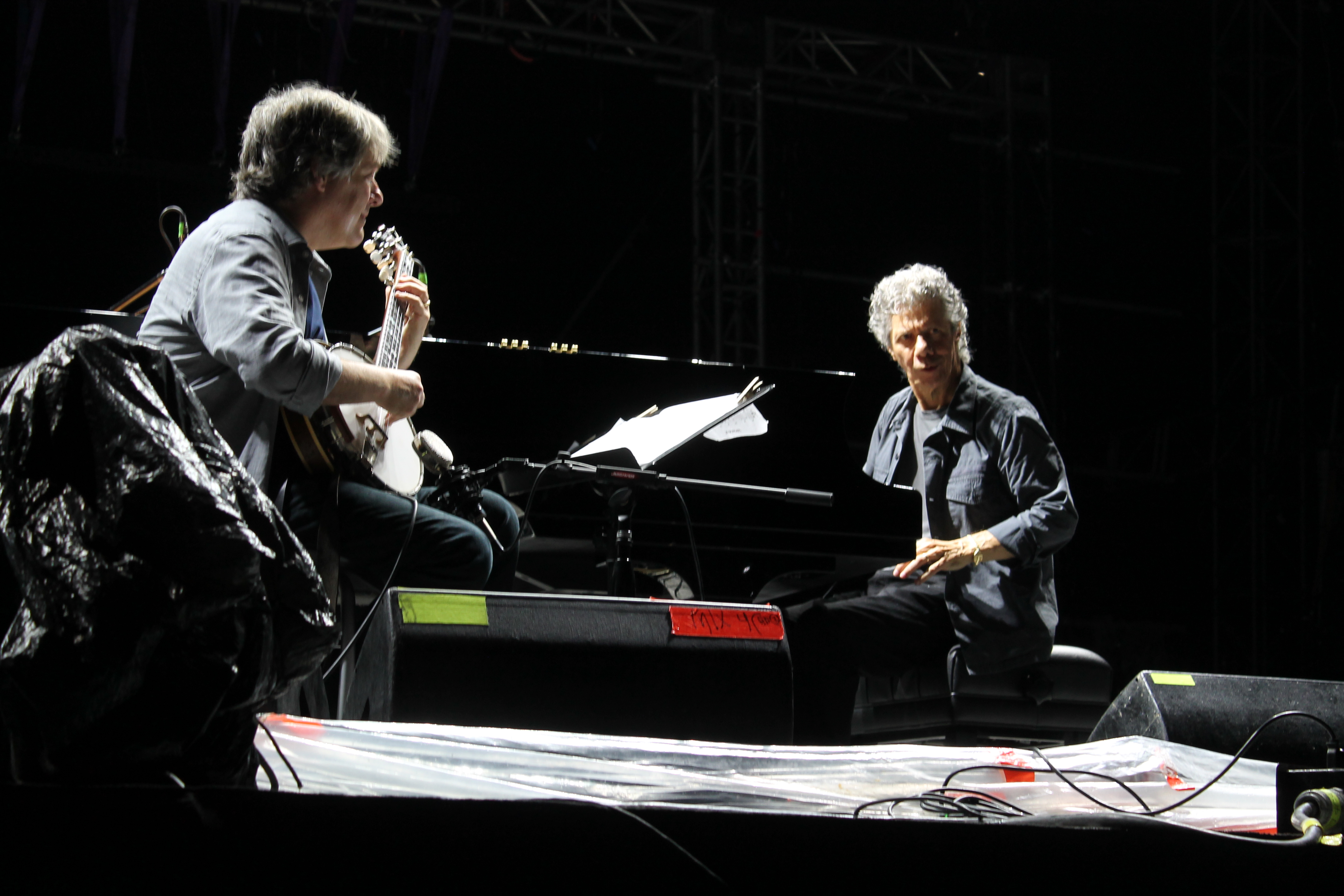
-When does a musician get to reach that level? When, as you said, “you just fly”?
-That’s the exciting part of it. I think about when people jump out of airplanes with the parachutes on their backs, they hate to pull the cord, they like the free fall. I think for improvisers it’s like running, it just feels so good when you are in the moment and it’s happening. And I’ve listened to a lot of recordings, a lot of music that I’ve done live and If I don’t remember what happened it’s usually a really good performance. If I remember what happened, it’s probably because I was too self conscious and didn’t play as well… but you do get these moments when everything is just falling your way when you are playing and those are the moments we live for…
-It gets spiritual, right?
-You tap into something outside, you are not conscious of the technique anymore and you’re very responsive to the moment. That happens with people that I’m inspired by. Like Chick for instance. People that have a strong rhythmic element in their playing and also a lot of intelligence. It sparks me. I start doing things I would never normally think of. If I sit down and write them… I would never write them.
-What would you say that has been your favorite collaboration? Because you have played with many different musicians from the classic world, jazz world, popular music world…
-I like the diversity. I love playing with my wife Abigail. We do two banjos and we perform all over the States…
-That record is also incredible.
-Yeah, I love that. I love playing with my old friends from bluegrass music world, Sam Bush, Jerry Douglas, Stuart Duncan and all of those guys, that brings out a different side. And I think what I’ve learned and I see that people like Chick have learned that as well, and Zakir and Pat Metheny… is that if we keep playing with lots of different musicians, our musical life remains exciting. I don’t see why we have to choose a favorite.
Playing with the Flecktones is way up there too because we found each other when we were all very young and we came out into the world together. Victor Wooten, Future Man, Howard Levy and Jeff Coffin. I feel that they are very extremely creative musicians, they have contributed a lot to music as long as I’ve known them.
-I found this beautiful parallelism: You were named after Béla Bartók, a composer who took music from many different towns of Europe to compose, and I also see that you took many different types of music to create something new. That’s being original, that’s what makes a real artist.
-I appreciate that you feel that way because music is a pursuit we do for love. I do well, I created a great way for making a living, but it’s not mainstream, I never expected to do as well as I have, to be able to play with the best musicians in the world and travel the world to do it, but it’s almost as if you were a monk. You try to pursuit music at an idealistic level that is always changing, a moving target.
-And it has to do a lot with honesty. When an artists is honest, he is unique.
-Nobody can be you, you are the only one… so if you try to copy someone else, you are a bad copy. But if you can be yourself as truly as possible you can become something special, which you were supposed to be in the first place.
-Gershwin asked Shröngberg to give him some lessons…
-I think if was Ravel, because he went to Paris to study… (Béla and I were right because Gershwin asked Shrönberg, Stravinsky and Ravel for classes, and all of them answered him the same thing. I know this thanks to the Mexican composer Miguel Almaguer)
-And he told him: no, you are unique as Gershwin, don’t be a bad copy of me.
-You can be a bad copy of Ravel, or you can be the best Gershwin in the world.
-And he was!
-Yeah.
-Okay… so, the banjo. You had the guts to come and tell us: the banjo was here since the beginning of jazz, it was used in classic music. Talk to me about this process and how you took this instrument into something that you love.
-Well that’s the key right there: I love the music. I wouldn’t care so much about bringing the banjo back to jazz if I didn’t love jazz and want to play it. I don’t know why I was ambitious enough to want to play with Chick Corea but I did and when I first started to play the banjo I wanted to play with people like him by far. Maybe musically I felt like I should be able to get to that level, work really really hard. I believe in myself, I don’t exactly know why. But then as I went along and felt there’s all these things I wanted to do like I wanted to play classical music, I thought it would sound good on the banjo, I wanted to play rock, I wanted to play jazz. You know? I wanted to play Latin music and I wanted to play Irish music, Indian music was also very interesting to me, and as I went along I discovered that I was not as unique as I thought I was, that the banjo started out playing African music, and in the very start of jazz music: when Louis Armstrong started there was banjo in the band so actually banjo had the right to be in jazz. And there was even better orchestras back in the late 1800’s and in the early 1900’s, people was playing tons of classical music on the banjo back then. Banjo was at the birth of blues and they kept playing banjos all over the place, American music started with banjo and then most of it got replaced by guitar.
Part of it is that I don’t come from the south, I come from New York City, so I was already an outsider to bluegrass, no matter what I could do I was never going to be someone who grow up in Tennessee or North of Carolina, or Kentucky, where bluegrass comes from. Because I was already an outsider I didn’t have as much to lose and I was so curious about all these different types of music, I just wanted to learn. And as I learned more and more about different music I also learned why banjo has an honest right to be part of it.
But it starts with me wanting to play, wanting to understand what the music was in the first place, it was coming from a purely musical basis not because I was trying to fight for banjo’s honor. As time goes on I find that I really feel good doing that because of all the stereotypes that were perpetrated on the poor banjo – everybody thinks it is only a southern white instrument – they don’t understand that it comes from the slaves and from West Africa, most people are not aware of that.
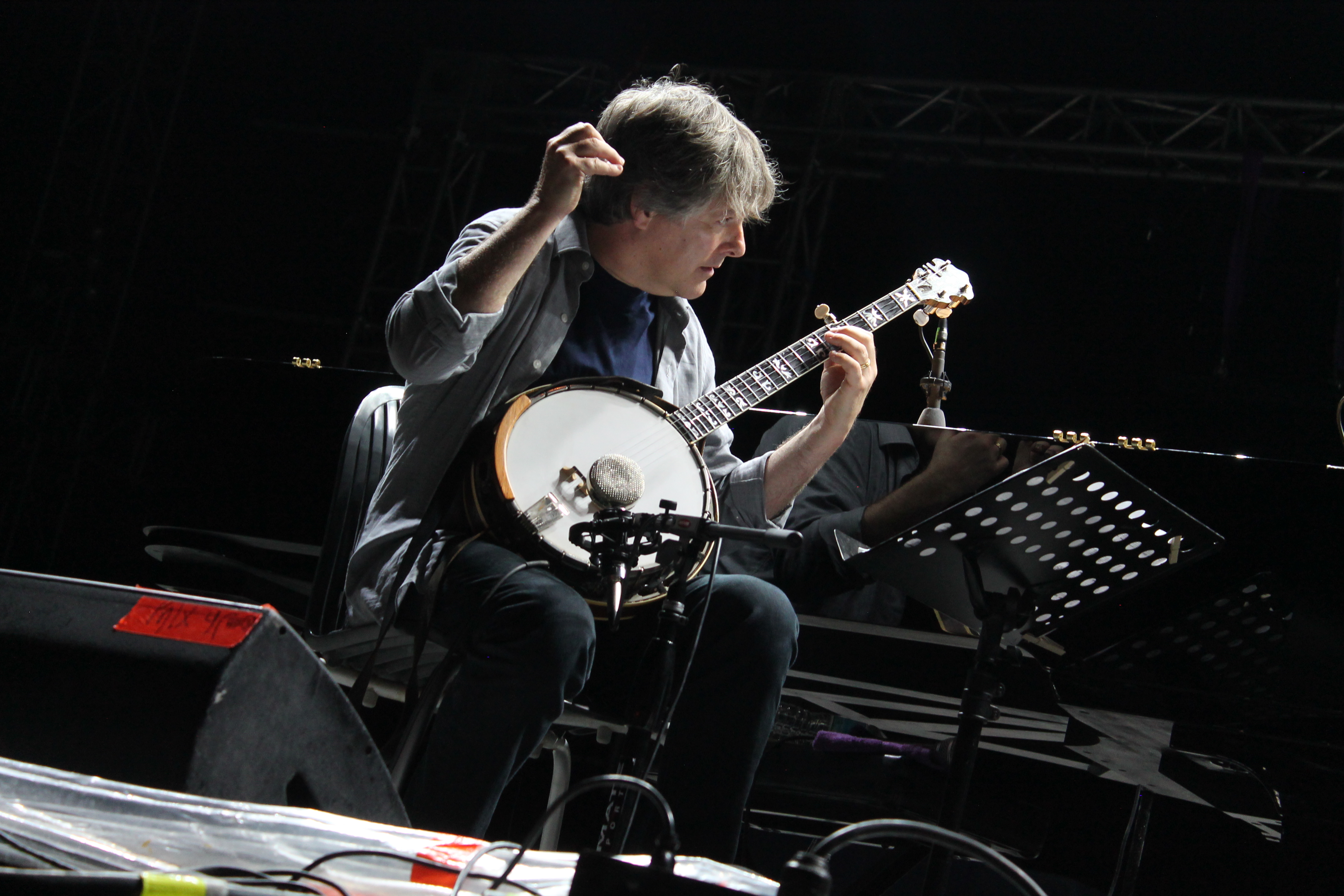
-Well, now we are telling them.
-But I also understand that is going to be more important to me and people that love the banjo than regular folks out there who have no reason to care about this, but it does teach us that things are not always what they look like, basically. It’s a good life lesson.
-I met old jazz musicians in Xalapa Veracruz, who told me that when they were young they were rejected because they played violin and guitar.
-I had those kinds of problems too. I wanted to go to Berklee School of Music because I was in Boston playing in a bluegrass band and there was no way for them to take me back then because I didn’t play an instrument that fit the curricula.
And then the other problem that I had was amplifying. The banjo is not as loud as electric guitar, drums, or saxophone. The kind of banjo that was playing with Louis Armstrong jazz was a four string banjo and when you played it with a pick it was much much louder then my kind; you can play chords and be heard right there with the trumpet and drums but the kind I play is much more delicate with finger picks, it’s more like playing an ethnic instrument. So I had to solve that problem, which was pretty hard.
To amplify the banjo and still have a sound that is worth playing…that was the thing There were a lot of great jams that I couldn’t play in because there was no way to be amplified. Some of the great jazz festivals that we used to play with the Flecktones, like North Sea Jazz Festival in the Nederlands, there would be a jam session in the basement after the concert and all the bands would get up there and plug their electric guitars, saxophones and drums and everybody would just go crazy and I… there was no way to do it. But I could do it in a professional setting because in the stage with the sound check I found the way, I figured out how to make banjo fit into these kinds of gigs, but it still is not easy to just jump out and play at a jam. I felt frustrated because I thought it could have helped me to be a better musician, to be able to jam more. I do find people to jam with if I’m just sitting in a room with a great guitar player, he doesn’t have to turn his amps up too loud and the music just sounds perfectly and the banjo balances.
-Even the technique changes…
-Yeah, when you amplify. So that’s always been tricky. That’s so nice when I play with Chick is just the two of us and we get to sound really nice. Both of the instruments sound beautiful and rich.
-You do. At some point you get to sound like a third person.
-Right, we are trying to turn it into a three handed piano.
-Is there anything you would like to say to the Mexican audience?
-I love what I do, I love learning about music through the banjo and I love getting to travel the world and play music with great musicians, I feel very fortunate. I hope the music is meaningful in their own lives. It means a lot when that happens. Because there are two sides of it: there is the part that it means for me and the part that it means for you when you listen, and I hope that it is not just for me. That’s my goal with it. Some people are like “let’s get so deep in it and be very personal with it”, but is hard for people to listen to, but I actually want to connect with people. But I also want to do very idealistic music, so I’m looking for that balance, that’s part of what I’m looking for: music that appeals for people but that also has those levels of complexity and history in the sound… and we could connect Africa, South America, Bluegrass, Classical, Indian and Jazz, I want it all to mix and make a song unique, a hybrid, and be itself and for people to love it.
-I love it!
-You are my target audience!
Thank you very much, dear Béla. I learned a lot from you today and I’m sure I will keep myself devoted to the beautiful art you create.
